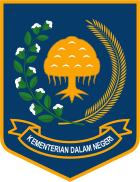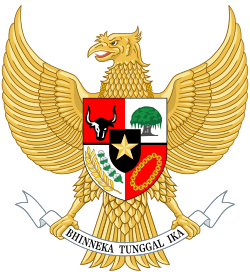Ministry of Home Affairs (Indonesia)
The Ministry of Home Affairs (Indonesian: Kementerian Dalam Negeri abbreviated Kemdagri) is a ministry of the Government of Indonesia responsible for internal matters of the state. It is headed by the Minister of Home Affairs, currently Tito Karnavian.[1]
| Kementerian Dalam Negeri | |
 | |
| Ministry overview | |
|---|---|
| Formed | 19 August 1945 as Department of Home Affairs |
| Preceding Ministry |
|
| Jurisdiction | Government of Indonesia |
| Headquarters | Jalan Medan Merdeka Utara No. 7 Jakarta Pusat 10110 Jakarta, Indonesia |
| Minister responsible |
|
| Child agencies |
|
| Key document | |
| Website | www |
The Ministry of Home Affairs is one of the ministries (along with the Ministry of Defence and the Ministry of Foreign Affairs) that is mentioned in the Constitution of Indonesia, so the president has no authority to dissolve this ministry, compared to other ministries that are not mentioned in the Constitution of Indonesia.
In the case that both of the president and the vice president can no longer serve at the same time, the line of succession falls to the minister of foreign affairs, minister of home affairs and minister of defence concurrently until the succeeding President and Vice President are elected by the People's Consultative Assembly within thirty days.[2]
The role of the department is officially given as:[3]
- Formulating national policies, operational policies and technical policies in the field of domestic governance;
- Conducting governance affairs in line with its tasks;
- Managing state properties/wealth that fall within its responsibilities;
- Supervising the conduct of its tasks;
- Submitting to the President reports that evaluate, suggest and consider in the field of its tasks and functions.
History
The Indonesian Department of Home of Affairs traces its origin to the Departement van Binnenlands Bestuur of the Dutch East Indies Government. Its main function was to oversee police force, transmigration, and agrarian matters. It existed until 1942, the year of the Japanese invasion. During the Japanese occupation (1942-1945) the name was changed to Naimubu (内務部). Its function was expanded to oversee religious, social, health, education, pedagogic, and cultural matters. Naimubu maintained its operations from its office at Jalan Sagara no. 7 Djakarta until 1945. On 19 August 1945 Naimubu was split into several departments:
- Department of Home Affairs (Departemen Dalam Negeri); at the time, still overseeing religious matters; Religious matters would eventually be cast out into the purview of newly established Department of Religious Affairs
- Department of Social Affairs
- Department of Health
- Department of Education, Pedagogic, and Culture
Department of Home Affairs was the first government department established under the Presidential Cabinet of Indonesia since the Independence. Due to changes of political situation and the constitution, the department had to be re-established several times. The nomenclature "Departemen Dalam Negeri" (Department of Home Affairs) was changed to "Kementerian Dalam Negeri" (Ministry of Home Affairs) in 2010.
Responsibility
Based on Peraturan Presiden No. 11 Tahun 2015,[4] Ministry of Home Affairs has responsibility to run services in internal governance for support the President in state governance. The ministry responsibilities are
- formulation, establishment and implementation of policies in the field of politics and public administration, decentralisation, development of the regional administration, coaching the village administration, coaching and development of local government affairs, local financial coaching, as well as the population and civil registration, in accordance with the provisions of the legislation;
- co-ordinating the implementation of the task, coaching, and providing administrative support to all elements of the organisation in the Ministry;
- managing of state property / wealth in the responsibility of the Ministry;
- supervising the execution of duties in the Ministry;
- organising technical guidance and supervision over the conduct of internal affairs in the locality government;
- co-ordinating, coaching and general supervision, facilitation, and evaluation of the regional administration in accordance with the provisions of the legislation;
- execution of research and development in domestic governance;
- execution of human resource development in domestic governance
- execution of technical activities of the centre to the regions
- execution of substantial support to all elements of the organisation in the Ministry
Organisational
Based on Peraturan Presiden No. 11 Tahun 2015, Ministry of Home Affairs is organized into the following:
- Office of the Deputy Minister of Home Affairs
- Secretariat General of Home Affairs
- Directorate General of Politics and Public Administration
- Directorate General of Territorial Administration
- Directorate General of Regional Autonomy
- Directorate General of Regional Development
- Directorate General of Village Governments
- Directorate General of Regional Finance;
- Directorate General of Population and Civil Registration (Dukcapil);
- Inspectorate General of Home Affairs
- Agency for Research and Development;
- Agency for Human Resources Development;
- Special Advisor to the Minister on Law and National Unity;
- Special Advisor to the Minister on Government;
- Special Advisor to the Minister on Society and Inter-Agency Relations;
- Special Advisor to the Minister on Economy and Development;
- Special Advisor to the Minister on Administrative and Public Services
The Home Affairs Ministry operates the Municipal Police and the Home Affairs Training Colleges (Institut Pemerintahan Dalam Negeri) with campuses located nationwide. Firefighting affairs (via the Indonesian Municipal Fire Services) are also handled by the Ministry through the respective local governments in the provincial level and below.
The Indonesian National Police, just like the National Armed Forces, is a direct reporting agency of the Office of the President (via the National Police Commission) for national public security affairs, and must coordinate its efforts and resource planning with the Ministry and with the Municipal Police for public security and civil defense affairs for serious cases.
See also
References
- "Tito Karnavian Jadi Mendagri, Fachrul Razi Menteri Agama" [Tito Karnavian becomes Home Minister, Fachrul Razi becomes Religious minister]. Detik.com. 23 October 2019. Retrieved 23 October 2019.
- Constitution of Indonesia, article 8 paragraph 3
- Republic of Indonesia: National Portal
- Peraturan Presiden 11/2015 (Indonesian)
